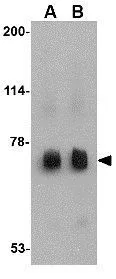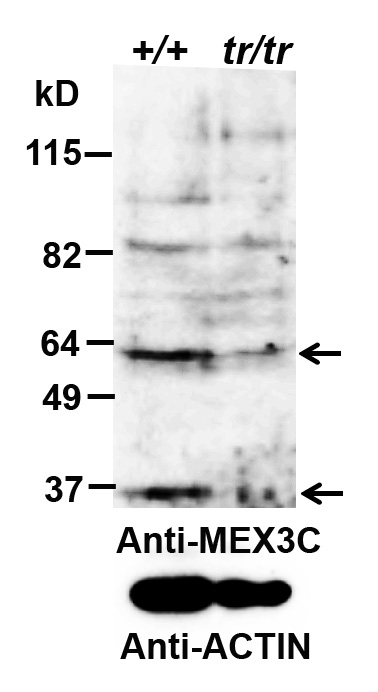
WB analysis of rat heart tissue lysate using GTX85374 MEX3C antibody. Working concentration : (A) 0.5 and (B) 1 μg/ml
MEX3C antibody
GTX85374
ApplicationsWestern Blot, ELISA
Product group Antibodies
ReactivityHuman, Mouse, Rat
TargetMEX3C
Overview
- SupplierGeneTex
- Product NameMEX3C antibody
- Delivery Days Customer9
- Application Supplier NoteWB: 0.5 - 1 microg/mL. *Optimal dilutions/concentrations should be determined by the researcher.Not tested in other applications.
- ApplicationsWestern Blot, ELISA
- CertificationResearch Use Only
- ClonalityPolyclonal
- Concentration1 mg/ml
- ConjugateUnconjugated
- Gene ID51320
- Target nameMEX3C
- Target descriptionmex-3 RNA binding family member C
- Target synonymsBM-013, MEX-3C, RKHD2, RNF194, RNA-binding E3 ubiquitin-protein ligase MEX3C, RING finger and KH domain-containing protein 2, RING finger protein 194, RING-type E3 ubiquitin transferase MEX3C, RNA-binding protein MEX3C, ring finger and KH domain containing 2
- HostRabbit
- IsotypeIgG
- Protein IDQ5U5Q3
- Protein NameRNA-binding E3 ubiquitin-protein ligase MEX3C
- Scientific DescriptionRkhd2, also known as MEX3C is a member of a novel family of four homologous human MEX3 proteins each containing two heterogeneous nuclear ribonucleoprotein K homology (KH) domains and one carboxy-terminal RING finger module. MEX3 proteins, including Rkhd2, are phosphoproteins that bind RNA through their KH domains and shuttle between the nucleus and the cytoplasm via the CRM1 export pathway. These proteins are a novel family of evolutionarily conserved RNA-binding proteins, differentially recruited to P bodies and potentially involved in post-transcriptional regulatory mechanisms. It has been suggested that genetic variations in Rkhd2 may be associated with susceptibility to essential hypertension type 8. Rkhd3 and Rkhd4, but not Rkhd2, co-localize with both the hDcp1a decapping factor and Argonaute (Ago) proteins in processing bodies (P bodies), recently characterized as centers of mRNA turnover.
- ReactivityHuman, Mouse, Rat
- Storage Instruction-20°C or -80°C,2°C to 8°C
- UNSPSC12352203




